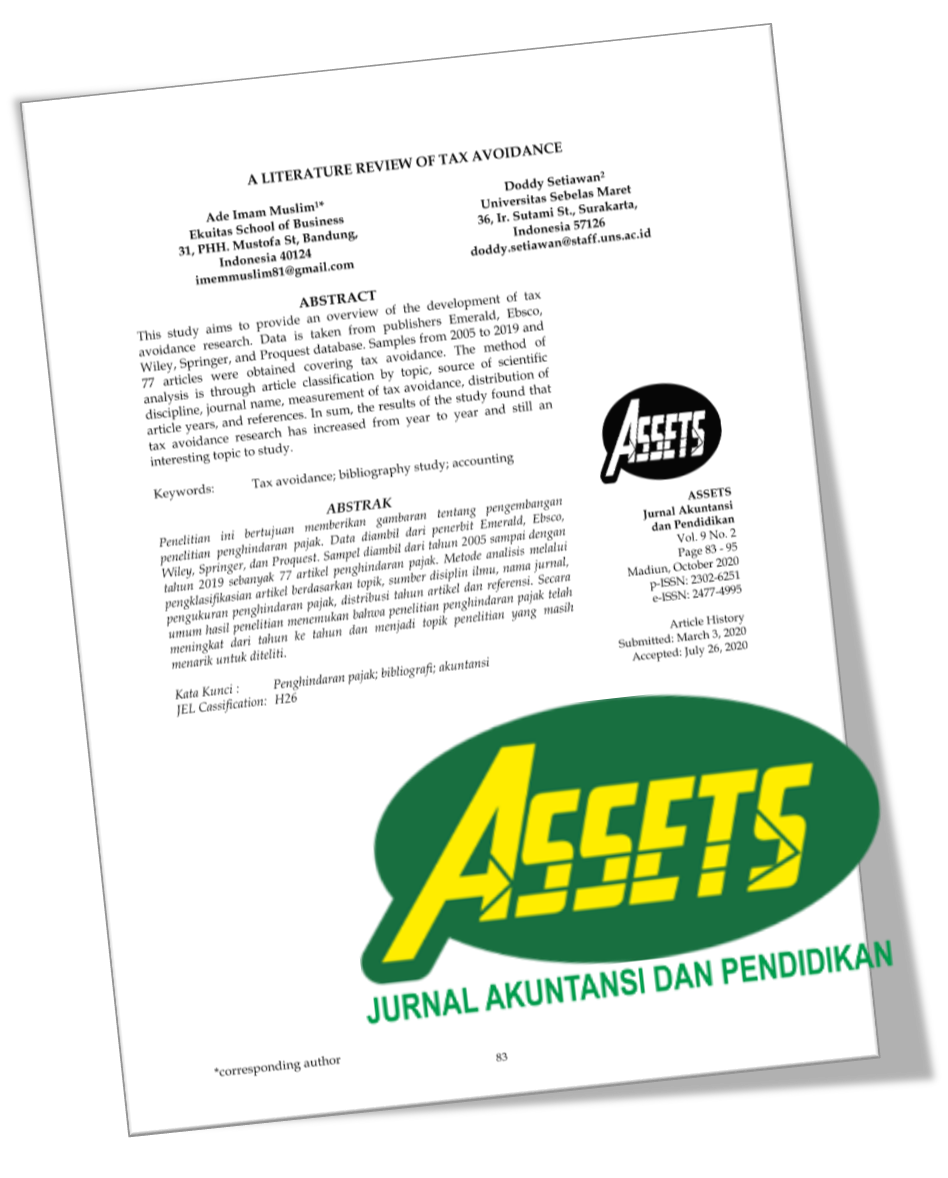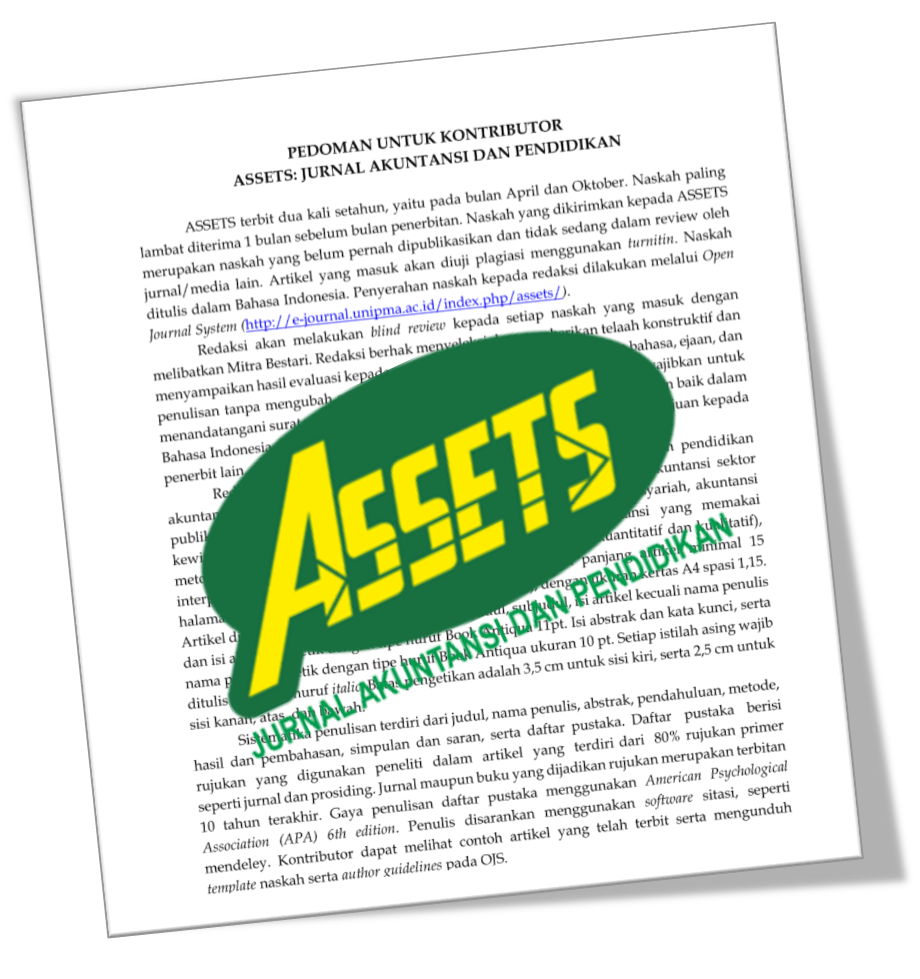Accounting Based Covenant Pada Obligasi Perusahaan Finance yang Terdaftar di Bursa Efek Indonesia
DOI:
https://doi.org/10.25273/jap.v7i2.2303Keywords:
kontrak utang publik, jangka waktu obligasi, jaminan, profitabilitas, kualitas obligasi dan accounting based covenantAbstract
Downloads
References
Bhattacharyay, B.N. (2011), “Bond market development in Asia: an empirical analysis of major determinantsâ€, Journal of Asian Economics, Vol. 24 No. 1, pp. 124-137.
Booth, L., Cleary, S. and Purda, L. (2013), “Debt rating initiations: natural evolution or opportunistic behavior?â€, Journal of Modern Accounting and Auditing, Vol. 9 No. 12, pp. 1574-1595.
Cai, K., Jiang, X. and Lee, H. (2011), “Debt IPO waves, investor sentiment, market conditions, and issue qualityâ€, working paper, University of Michigan, MI.
Chaudhari, K., Raje, M. and Singh, C. (2014), “Corporate bond markets in India: a study and policy recommendationsâ€, Indian Institute of Management: Bangalore, Working Paper 450
El Gazzar, S. dan V. Patena. (1991). Factors effecting the scope and initial tighness of covenant restrictions in private lending agreements, Contemporary Accounting Research, 8(1), 132-151.
Inamura, Y. (2009). The determinants of accounting-based covenants in public debt contracts, Journal of international Business Research, 8(2), 1-15.
Jensen, M.C. dan W.H. Meckling.(1976). The theory of the firm : managerial behaviour, agency costs and ownership structure, Journal of Financial Economics, 3(4), 305-360.
Mansi, S., Qi, Y. and Wald, J. (2012), “Debt covenants and bankruptcy riskâ€, working paper, Virginia Tech, VA.
Mariano, B. dan J.A. Tribo. (2009). Debt covenant and corporate investment, University Carlos III of Madrid Working Paper Series.
Mu, Y., Phelps, P. and Stotsky, J. (2013), “Bond markets in Africaâ€, IMF Working Paper WP/13/12.
Ojah, K. and Pillay, K. (2009), “Debt markets and corporate debt structure in an emerging market: the South African exampleâ€, Economic Modelling, Vol. 26 No. 1, pp. 1215-1227.
Rauh, J. and Sufi, A. (2010), “Capital structure and debt structureâ€, Review of Financial Studies, Vol. 23 No. 12, pp. 4242-4280.
Reisel, N. (2014), “On the value of restrictive covenants: empirical investigation of public bond volumesâ€, Journal of Corporate Finance, Vol. 27, pp. 251-268.
Scott, R. (2009). Financial accounting theory, London, Prentice Hall Inc.
Sulistiani, D. , Subroto, B. dan Chandrarin, G. (2014). Faktor-Faktor Yang Mempengaruhi Perjanjian Utang Berbasis Akuntansi (Accounting - Based Covenant) Pada Obligasi Yang Diterbitkan Oleh Perusahaan Yang Terdaftar Di Bursa Efek Indonesia. Proseedings SNA XVII di Mataram.
www.idx.co.id,
www.ojk.go.id
Downloads
Published
Issue
Section
License
Perjanjian Lisensi dan Hak Cipta
Saat mengirimkan naskah ke jurnal, penulis menyatakan bahwa:
- Mereka diberi wewenang oleh rekan penulisnya untuk masuk ke dalam perjanjian ini.
- Karya yang dimaksud belum pernah diterbitkan secara resmi sebelumnya, kecuali dalam bentuk abstrak atau sebagai bagian dari kuliah, resensi, tesis, atau overlay jurnal yang diterbitkan.
- Karya yang dimaksud tidak sedang dipertimbangkan untuk diterbitkan di tempat lain,
- Publikasi karya yang dimaksud telah disetujui oleh semua penulis dan oleh otoritas yang bertanggung jawab - secara tahu sama tahu atau eksplisit - dari lembaga tempat pekerjaan itu dilakukan.
- Mereka mengamankan hak untuk mereproduksi materi apa pun yang telah diterbitkan atau dilindungi hak cipta di tempat lain.
- Mereka menyetujui lisensi dan perjanjian hak cipta berikut.
Hak Cipta
Penulis yang menerbitkan dengan ASSETS: Jurnal Akuntansi dan Pendidikan menyetujui persyaratan berikut:
- Penulis mempertahankan hak cipta dan memberikan jurnal hak publikasi pertama dengan karya yang secara bersamaan dilisensikan di bawah Lisensi Atribusi Creative Commons (CC BY-SA 4.0) yang memungkinkan orang lain untuk berbagi karya dengan pengakuan kepenulisan karya dan publikasi awal di jurnal ini.
- Penulis dapat masuk ke dalam pengaturan kontrak tambahan yang terpisah untuk distribusi non-eksklusif dari versi jurnal yang diterbitkan dari karya tersebut (misalnya, mempostingnya ke repositori institusional atau menerbitkannya dalam sebuah buku), dengan pengakuan publikasi awalnya di jurnal ini.
- Penulis diizinkan dan didorong untuk memposting karya mereka secara daring (misalnya di repositori institusional atau di situs web mereka) sebelum dan selama proses pengiriman, karena dapat menghasilkan pertukaran yang produktif, serta kutipan lebih awal dan lebih besar dari karya yang diterbitkan.
License and Copyright Agreement
In submitting the manuscript to the journal, the authors certify that:
- Their co-authors authorize them to enter into these arrangements.
- The work described has not been formally published before, except as an abstract or part of a published lecture, review, thesis, or overlay journal.
- That it is not under consideration for publication elsewhere,
- That its publication has been approved by all the author(s) and by the responsible authorities – tacitly or explicitly – of the institutes where the work has been carried out.
- They secure the right to reproduce any material already published or copyrighted elsewhere.
- They agree to the following license and copyright agreement.
Copyright
Authors who publish with ASSETS: Jurnal Akuntansi dan Pendidikan agree to the following terms:
- Authors retain copyright and grant the journal right of first publication with the work simultaneously licensed under a Creative Commons Attribution License (CC BY-SA 4.0) that allows others to share the work with an acknowledgment of the work's authorship and initial publication in this journal.
- Authors can enter into separate, additional contractual arrangements for the non-exclusive distribution of the journal's published version of the work (e.g., post it to an institutional repository or publish it in a book), with an acknowledgment of its initial publication in this journal.
- Authors are permitted and encouraged to post their work online (e.g., in institutional repositories or on their website) before and during submission, as it can lead to productive exchanges and earlier and more extraordinary citations of published work.

ASSETS: Jurnal Akuntansi dan Pendidikan is licensed under a Creative Commons Attribution-ShareAlike 4.0 International License.










